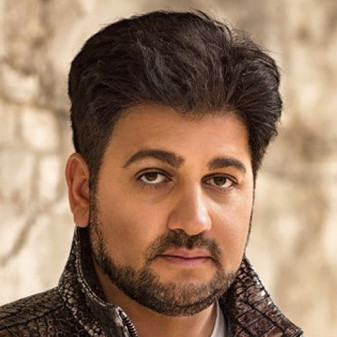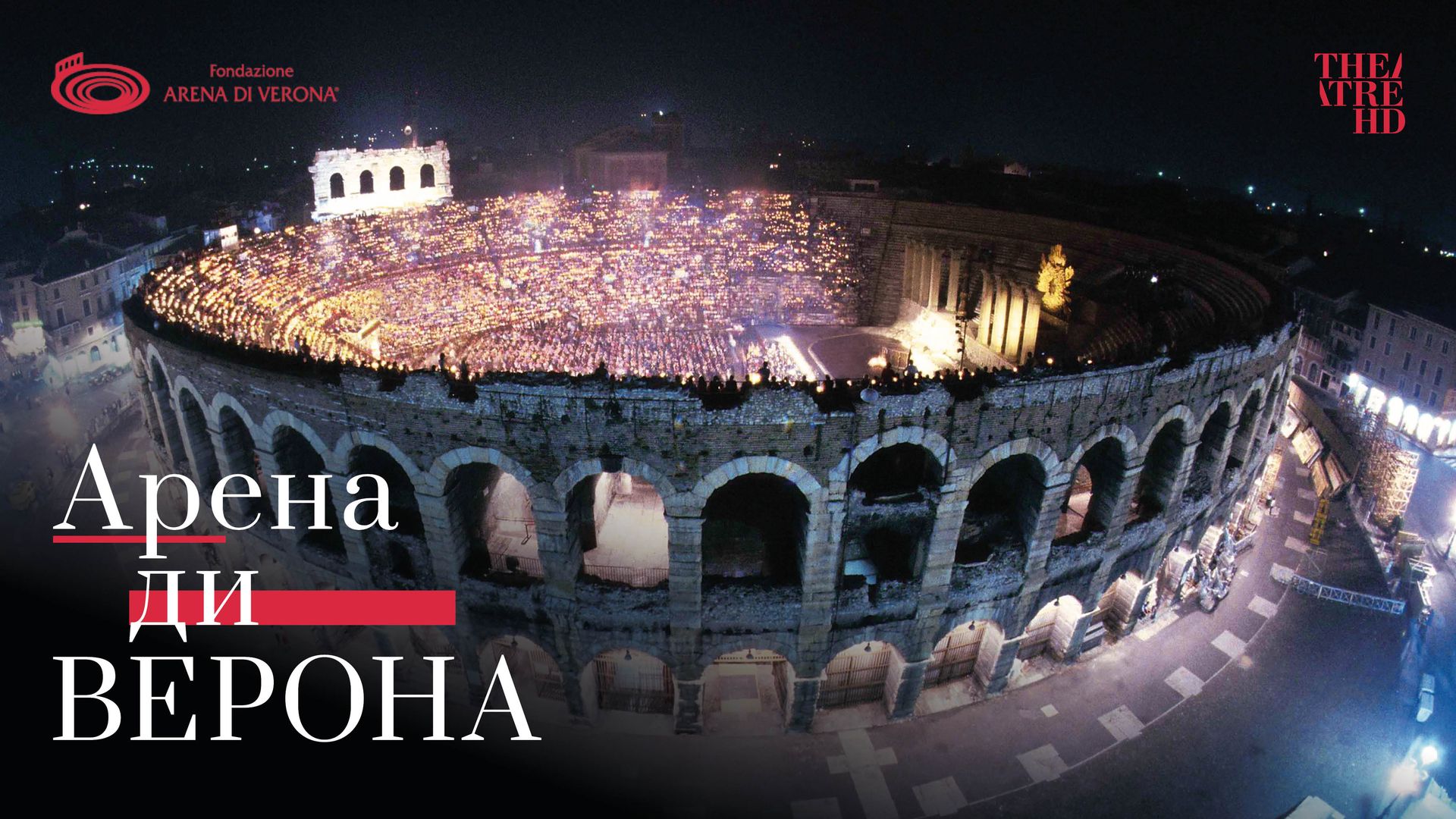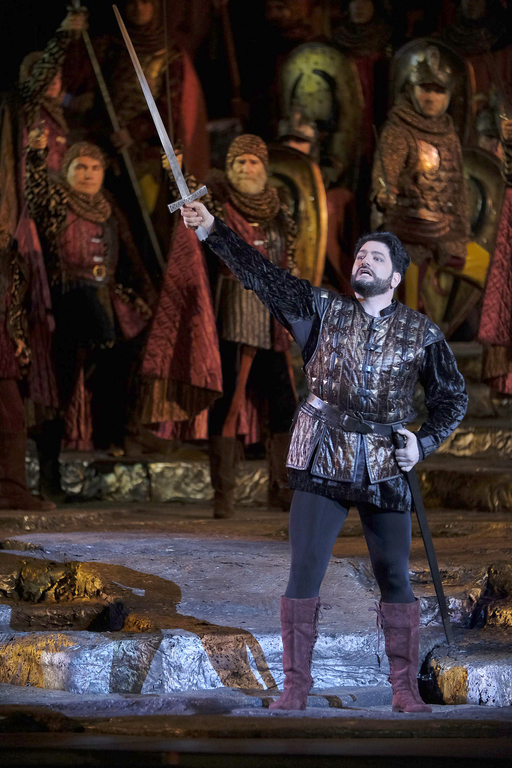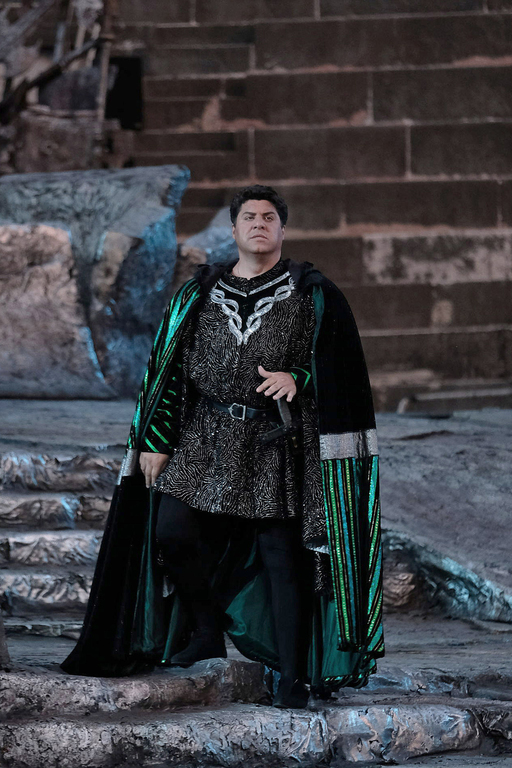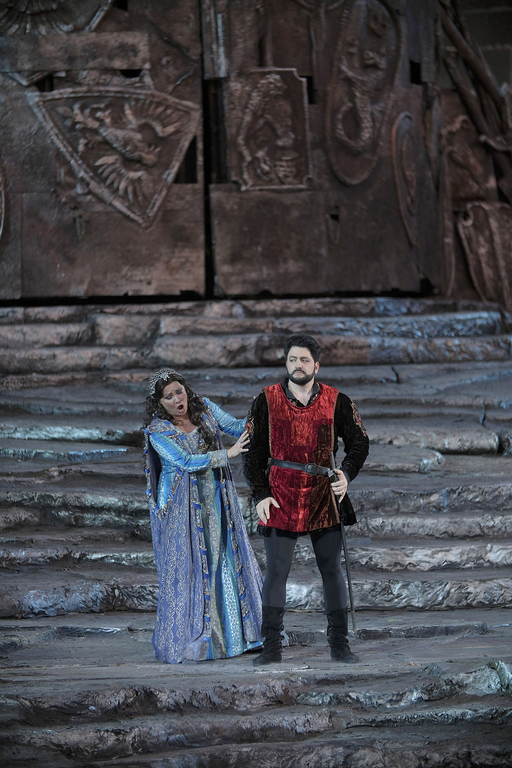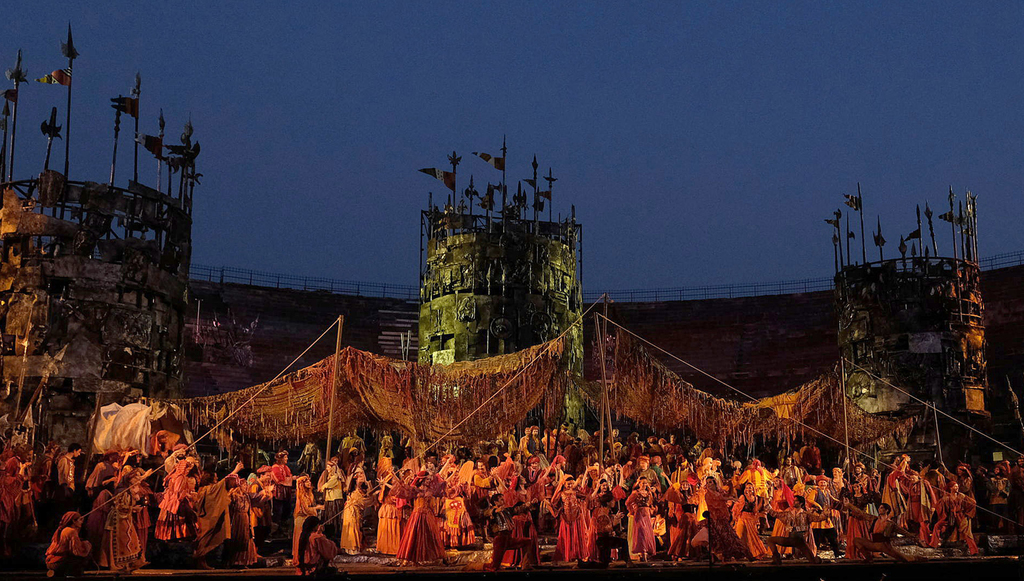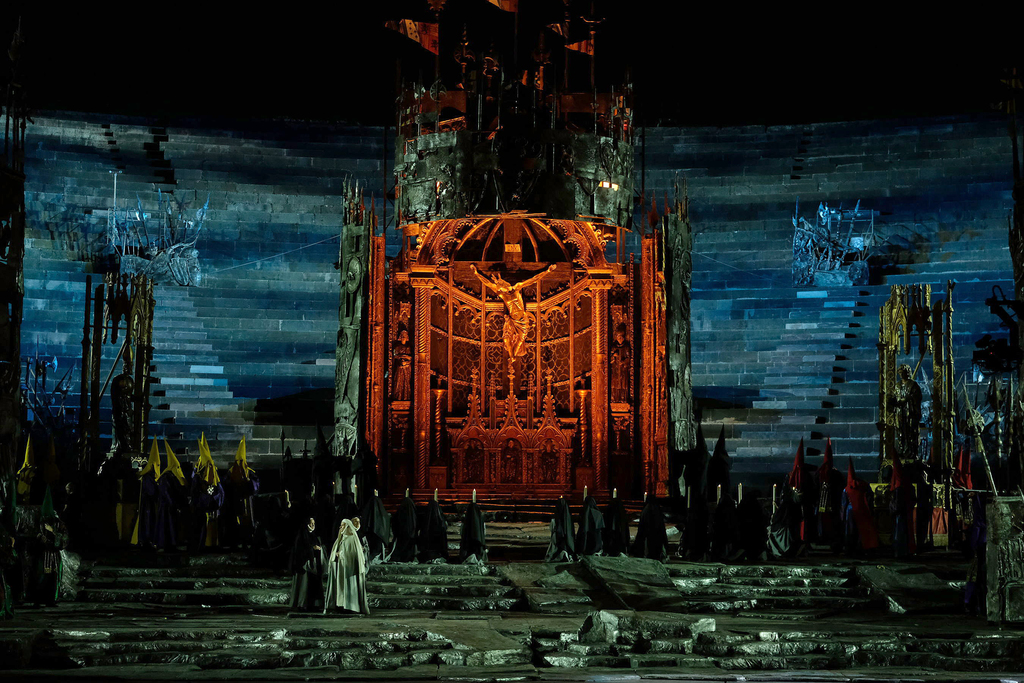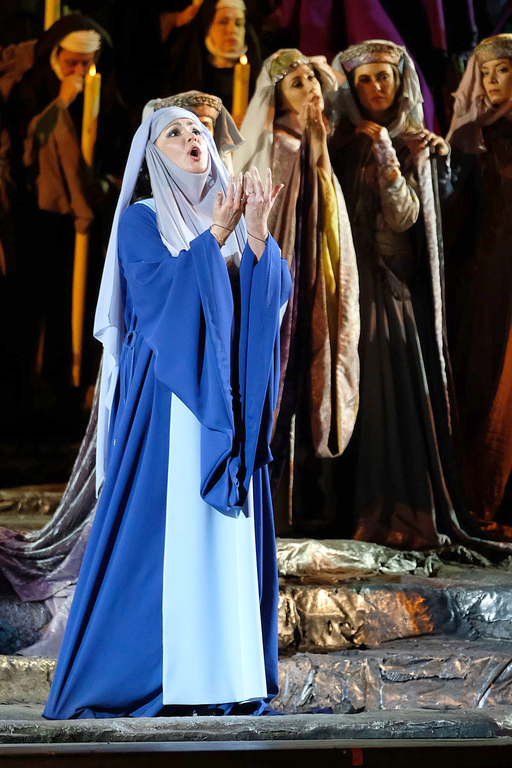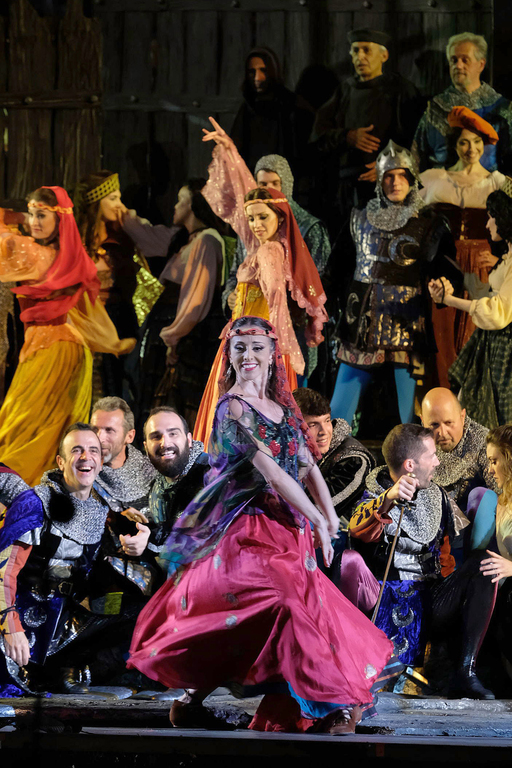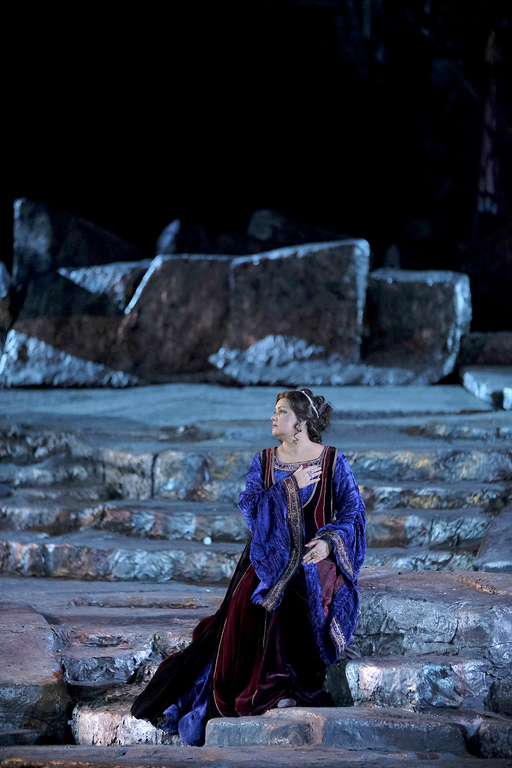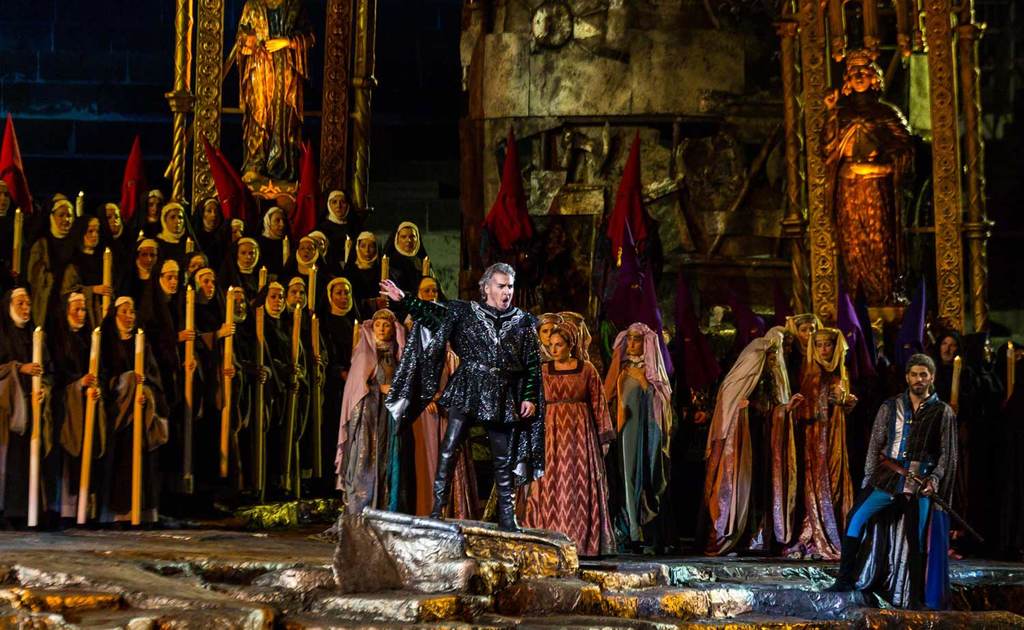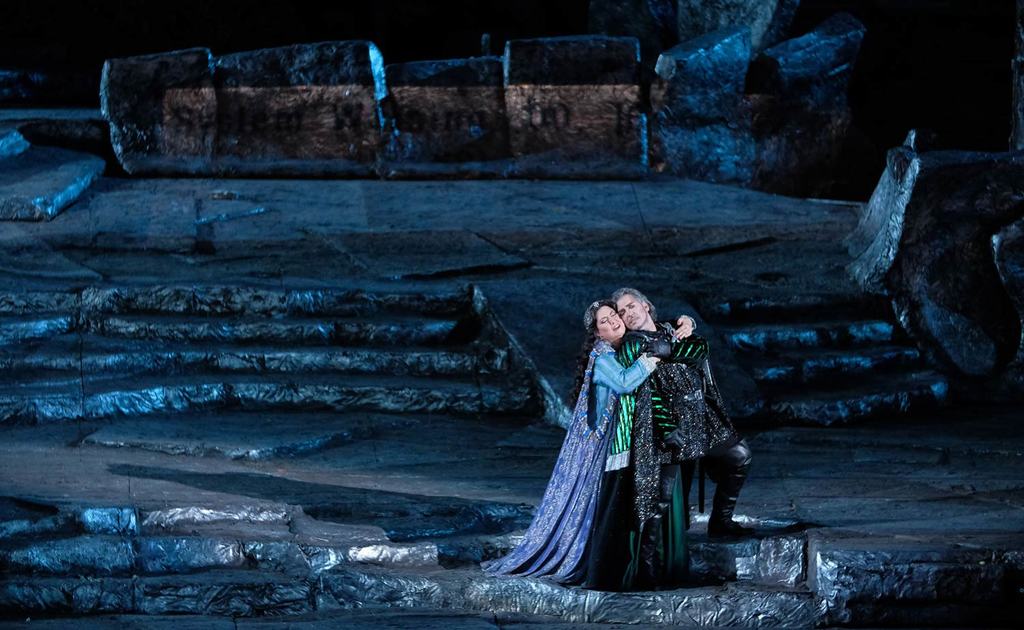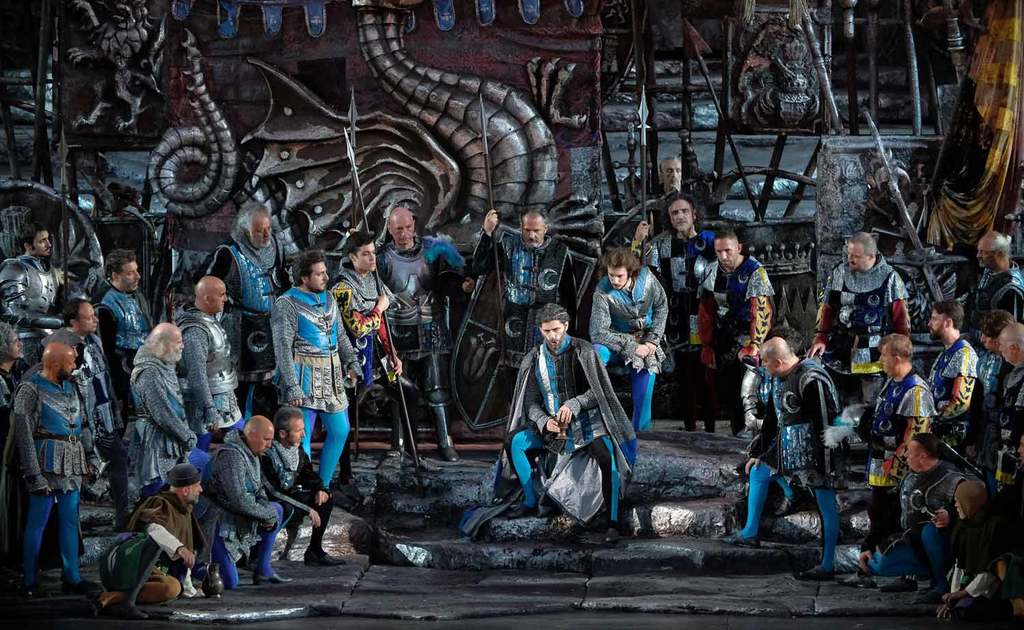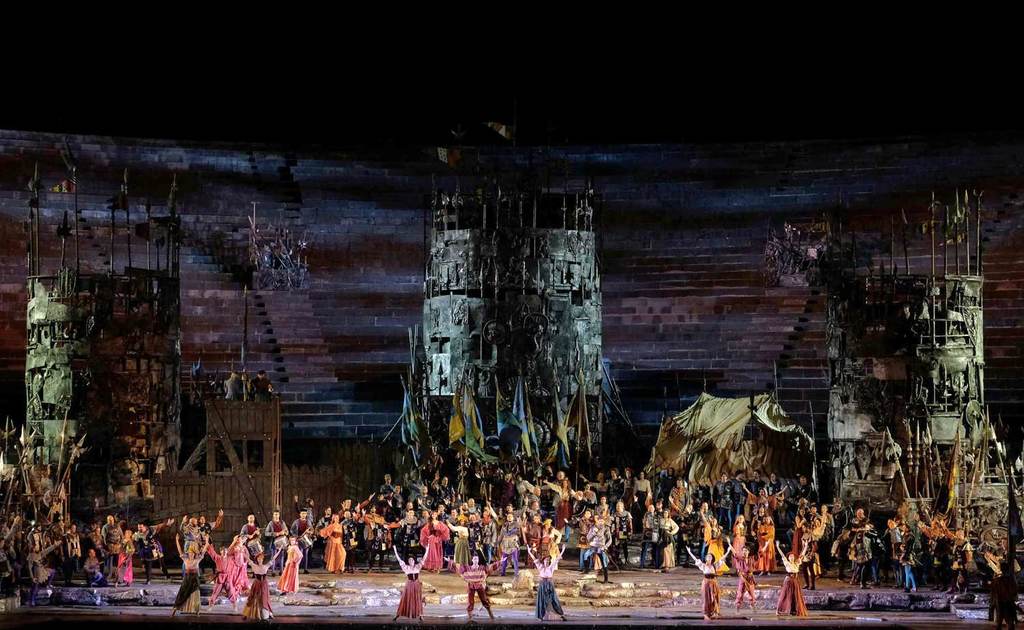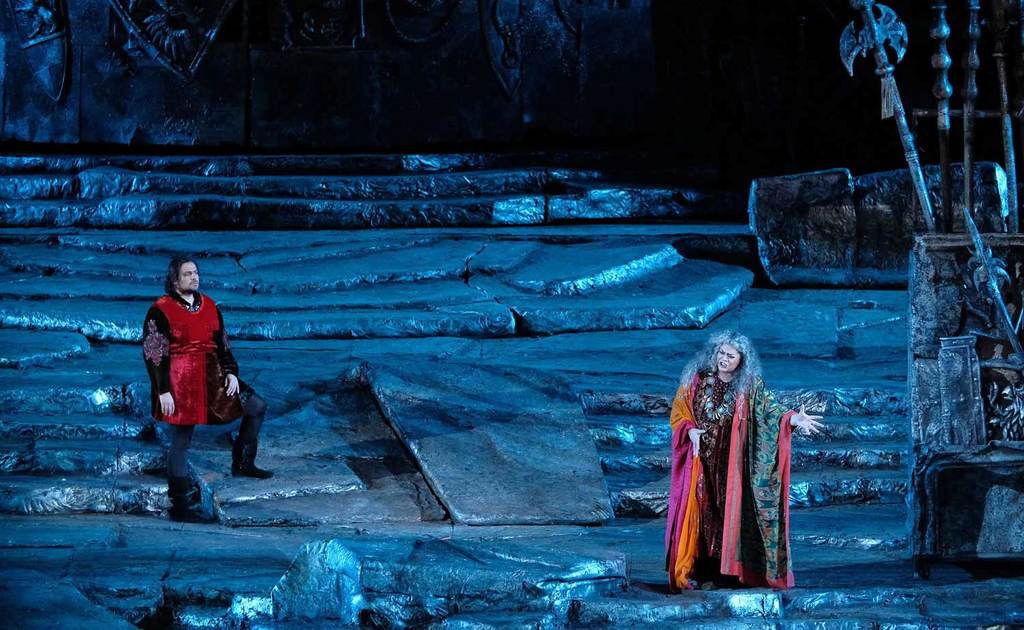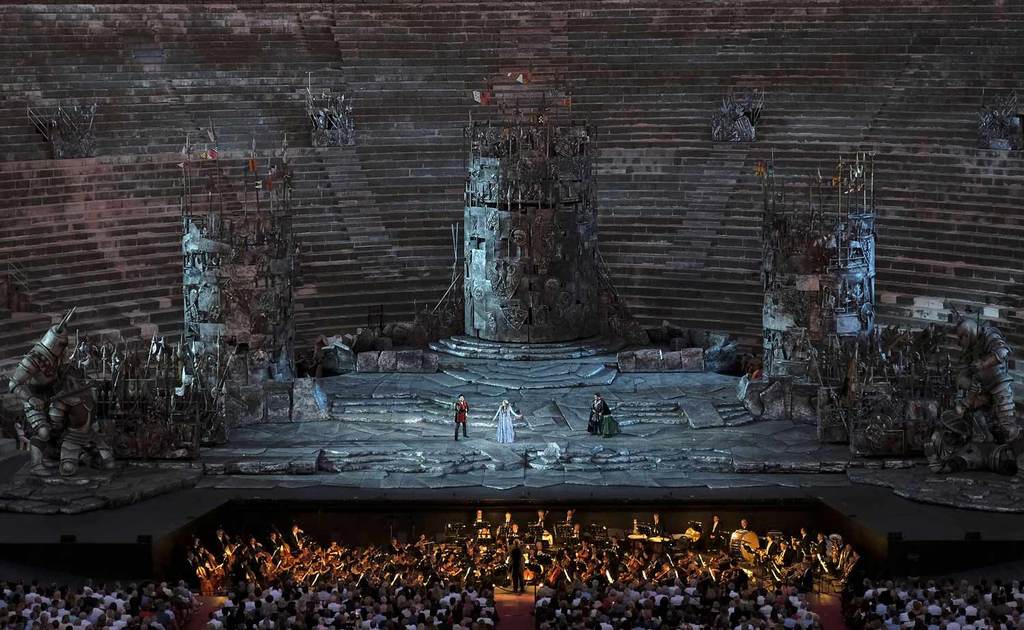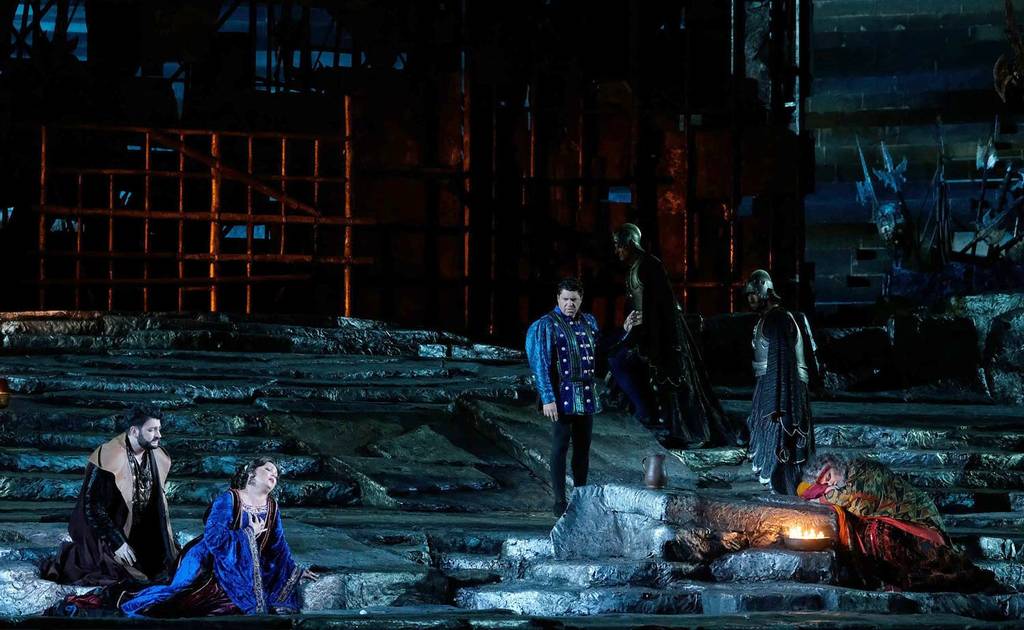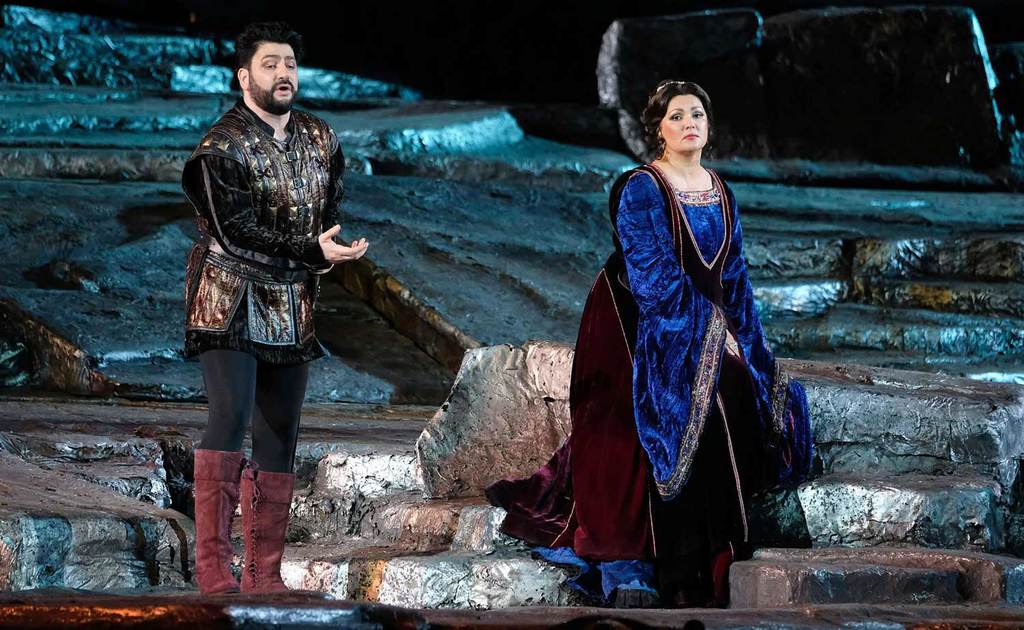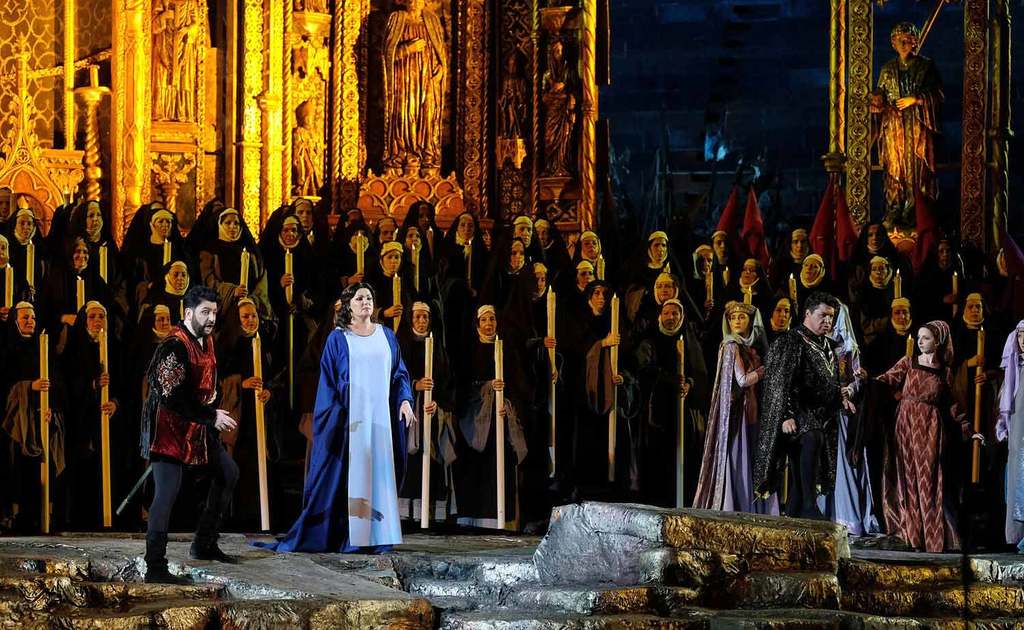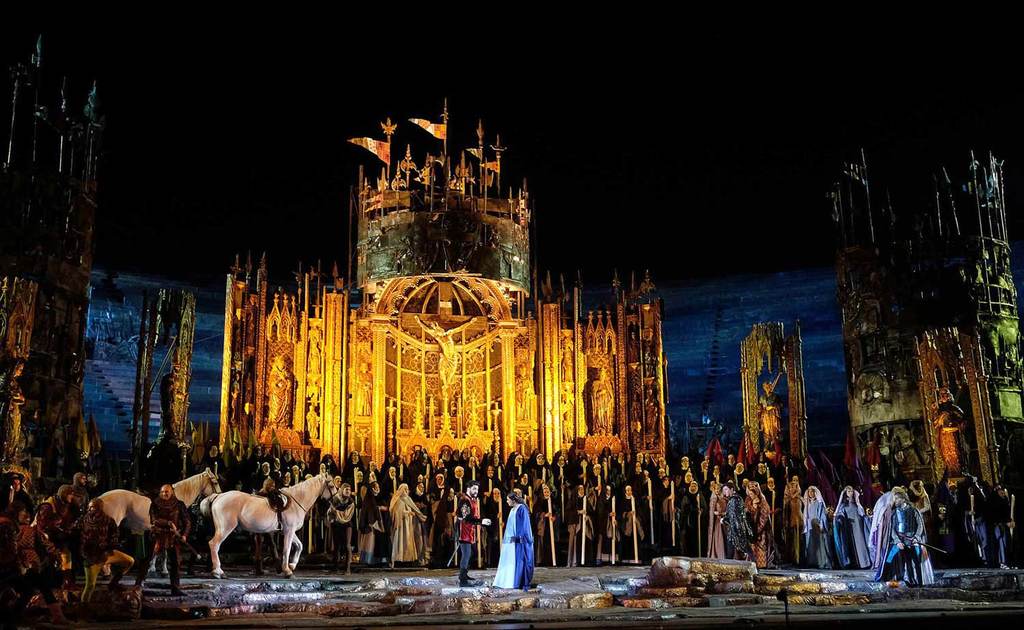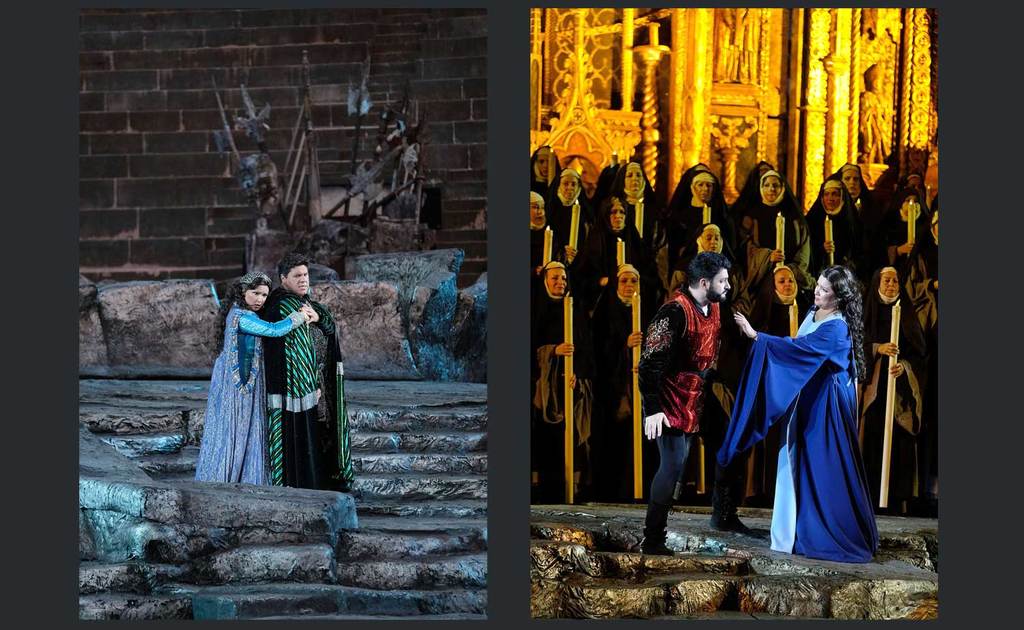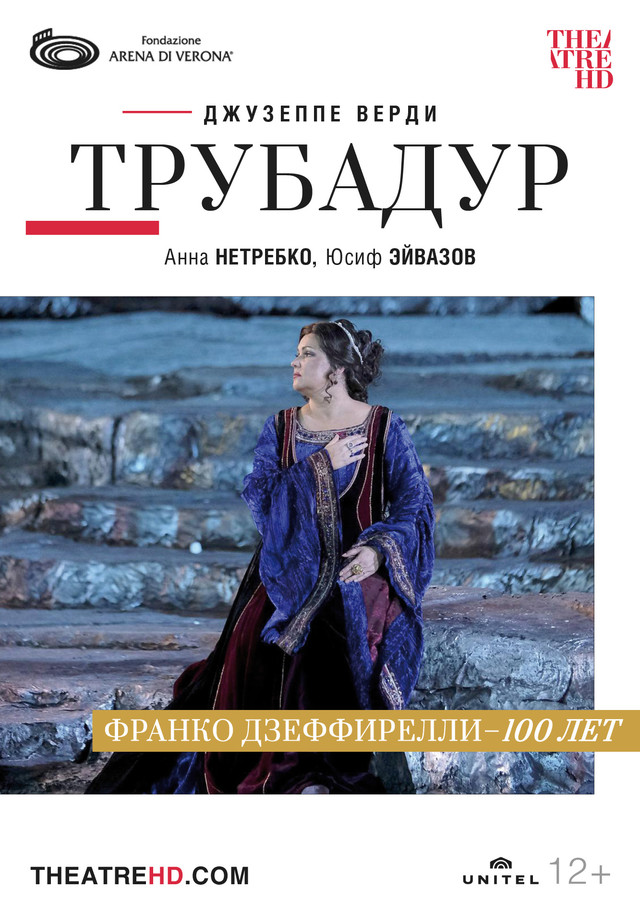
Arena di Verona: Il Trovatore
Арена ди Верона: Трубадур
A spectacular production by Maestro Franco Zeffirelli. In the stellar cast conducted by Pier Giorgio Morandi: Salsi, Zajick, Fassi, Zizzo, and the eagerly awaited debut of Anna Netrebko at the Arena di Verona alongside the protagonist Yusif Eyvazov, her partner on stage and also in life.
Actors
Count di Luna
Leonora
Azucena
Manrico
Ferrando
Ruiz
Crew
Costume Designer
Raimonda Gaetani
Verdi’s Il Trovatore according to the spectacular pictorial vision and narrative effectiveness of Franco Zeffirelli is a fascinating mysterious nocturne illuminated by threatening flames and surprising flashes, a space that is monumental, but nevertheless agile and changeable, transformed in a few moments from a fortress into a gypsy tent, from a battlefield into a luminous cathedral. These features are combined with the coupes de théâtre created by Zeffirelli himself, the romantic noble costumes by Raimonda Gaetani, the Hispanic dances of El Camborio adapted by Lucia Real and the breathtaking fights prepared by master of arms Renzo Musumeci Greco, which made it, right from the first performance in 2001, one of the most complete shows acclaimed by the audiences and critics, to the point of being staged again in the 2002, 2004, 2010, 2013 and 2016 editions of the Festival.
For the 97th Arena di Verona Opera Festival Il Trovatore also features a cast of Verdi voices that is currently hard to find even on the world’s most prestigious stages: for the first three dates, the troubadour Manrico is Azeri tenor Yusif Eyvazov, a greatly applauded Radamès and recent winner of the Lugo Award, alongside an exceptional primadonna, the marvellous Russian soprano Anna Netrebko, his partner on stage as well as in life, on her absolute debut in the role of the angelic heroic Leonora, a role in which she has been applauded in Salzburg, Berlin and New York. His pugnacious rival is Count di Luna by Luca Salsi, a baritone established with Verdi repertoire by conductors of the calibre of Riccardo Muti and already a colleague of the Netrebko-Eyvazov couple in Andrea Chénier at the first night at Milan’s Teatro alla Scala a year and a half ago. The gypsy Azucena, the opera’s occult force a character of which Verdi was very fond, is performed by mezzo-soprano Dolora Zajick, star of the MET and absent from the Arena for many years. With them, as Ferrando, on his debut at the Verona amphitheater, is the young bass Riccardo Fassi, following his very recent successes in Milan and Vienna.
Maestro Pier Giorgio Morandi, a great connoisseur of Italian opera, is conducting the stellar cast and the Arena Orchestra, as well as the Chorus directed by chorusmaster Vito Lombardi and the Dancers coordinated by Gaetano Petrosino. The technicians are also committed to the utmost to ensuring the audience the richness and complexity of the magnificent show conceived by the late Franco Zeffirelli for the unique spaces of the Arena di Verona.
“Anna Netrebko enchanted the audience as Leonora”
- Rai New
“Unforgettable”
- Verona Settegiorni
“Those two stars [Netrebko & Eyvazov] will fascinate everybody!”
- Weser-Kurier
- Weser-Kurier
“Arenissima!!!”
“The Arena is on its way to become the ‘Scala of the Summer’ [….] again“
„Zeffirelli gives to the arena what it merits: a colourful, multifaceted staging in which impressive mass scenes alternate with intimate moments [...]“
„Netrebko is the Leonora of our days. Displaying an enormous stage presence from the first second on […] she sang a Leonora that couldn’t be more convincing!“
„Luca Salsi’s noble baritone was entirely convincing. A perfect Verdi baritone.“
„A magnificent night!“
- Der Neue Merker
“The Arena is on its way to become the ‘Scala of the Summer’ [….] again“
„Zeffirelli gives to the arena what it merits: a colourful, multifaceted staging in which impressive mass scenes alternate with intimate moments [...]“
„Netrebko is the Leonora of our days. Displaying an enormous stage presence from the first second on […] she sang a Leonora that couldn’t be more convincing!“
„Luca Salsi’s noble baritone was entirely convincing. A perfect Verdi baritone.“
„A magnificent night!“
- Der Neue Merker
“What we find intact in this beautiful production, is the spirit that animated the best works of the director [Zeffirelli]”
“The story comes to vivid life, involves and amazes us with the skillful use of mass scenes and intelligent coups de théâtre”
- Opera Click
“The story comes to vivid life, involves and amazes us with the skillful use of mass scenes and intelligent coups de théâtre”
- Opera Click
Arena di Verona
The huge stage of the ancient Arena di Verona is a grand scenery in itself. But it is not so easy to live up to it. The great Franco Zeffirelli considered the Arena the ideal stage: here he could demonstrate both his ability to work with large spaces and his meticulous attention to detail.
The arena presents a challenge to directors, and when they accept this challenge and successfully cope with it, the audience receives truly monumental, colorful and breathtaking productions. These are exactly the ones presented in our collection for the big screen.
→
ACT I – THE DUEL
In the vestibule of the palace of Aljaferia in Saragoza, a group of sleepy guards await the return of the Count di Luna. A man is watching the apartments of Leonora, lady-in-waiting to the Queen of Aragon. He is obsessed with jealousy and fears that the young woman is being seduced by a mysterious troubadour who sings in the palace gardens every evening. Ferrando, captain of the guards, seeks to keep his men awake by recounting the tragedy that hangs over the Count’s family. It is the story of a gypsy woman, burnt at the stake for witchcraft on the orders of the Count di Luna’s father and of her daughter, Azucena who, out of revenge, abducts one of the nobleman’s children and burns him in the same place as her mother. Everyone curses Azucena: in fact, no-one knows where she is, but the actual Count, following his father’s death of a broken heart, continues looking for her. Midnight chimes. The soldiers and the superstitious are convinced that the ghost of the gypsy burnt alive still lives and infests the castle. In the public gardens, Leonora awaits her troubadour. She reveals her innermost secret to her friend, Ines: she had met him during a tournament of cavaliers but then the years of civil war had separated them. Now the young man has returned and he visits her each night, to serenade her. She loves him and admits she is even willing to die for him. The women re-enter their rooms and the Count arrives, intending to declare his love to Leonora. He stops, however, when he hears the troubadour’s voice in the distance. The situation instantly becomes heated. Leonora rushes out into the gardens and, deceived by the dark, finishes in the Count’s arms. The misunderstanding is clarified when the troubadour appears and reveals his identity: he is Manrico, not only the Count’s rival in love, but also a dangerous political enemy. The two challenge each other to a duel. Leonora faints and falls to the ground. 108 109 Il Trovatore
ACT II – THE GYPSY
In a camp in the mountains of Biscay, the gypsies begin their work, hammering on anvils. A big fire burns. With her eyes fixed on the flames, Azucena starts singing a lugubrious song: she is continually obsessed by her mother’s pyre. Manrico, wounded in the duel with the Count, is beside her. Azucena tells him the story, already told by Ferrando, reliving the tragedy from her point of view. To avenge her mother’s death, in a raptus she abducted the old Count’s second child from his cradle, but in her frenzy she flung her own child into the fire, not the Count’s. Disconcerted, Manrico then asks her whose son he is. Azucena regains her composure, tries to retract her involuntary confession and invites him not to take heed of idle talk. Almost as if driven by an unconscious call, the lad recounts that after having fought and won the duel with the Count, a mysterious voice had told him to spare the Count’s life. The gypsy makes him swear that next time he will not listen to that voice and she urges him to take vengeance. A messenger arrives to tell Manrico that Leonora believes he is dead and that she intends to enter a convent. The young man, notwithstanding his mother’s attempts to dissuade him, hurries off to the convent to impede Leonora from taking her vows. Count di Luna has, however, already arrived at the convent near the Rock of Castellor and has hidden himself in the shadows, along with his guards. His intention is to abduct Leonora but his plan is thwarted by Manrico who appears with his henchmen, much to the stupor of all present (everyone had believed him dead). After having disarmed the Count and his men, Leonora flees with Manrico.
ACT III – THE GYPSY’S SON
It is the eve of the battle. The Count’s troops set up camp near Castellor, the fortress in the hands of the rebels where Leonora and Manrico have taken refuge. The soldiers stop a gypsy, believing her to be a spy. It is Azucena. While she is being interrogated by Count di Luna, Ferrando recognizes her as the woman who had abducted the Count’s brother many years previously. Under torture, out of desperation, Azucena gives herself away by invoking Manrico’s name in the hope that he will come and save her. Count di Luna now realizes that the woman he has in his hands is not only the person who burnt his brother, but also the mother of his rival in love. He has her condemned to the stake. Inside the fortress, Leonora and Manrico are preparing to marry. Leonora, however, is agitated by an awful presentiment. Manrico seeks to tranquillise her but he, too, is uneasy, filled with a sense of resignation. As they enter the church for the ceremony, news reaches them that Azucena has been captured and is to be burnt alive. Manrico musters all his men and with heroic dash, rushes off to save his mother.
ACT IV – THE TORMENT
Manrico is defeated. He and his mother are imprisoned in the Palace of Aljaferia. At night Leonora, who has managed to disappear without trace, reaches the tower where her troubadour is imprisoned determined to save him. She will do anything, even marry the Count who has condemned Manrico to decapitation and the gypsy woman to the stake. Once the Count has promised her that Manrico will be spared, she secretly swallows some poison which she has hidden in her ring. In a dark cell Azucena cannot sleep. She is obsessed by the vision of her mother in the flames. Manrico consoles her and finally the woman drops off, comforted by the illusion that one day she will return to a free life, and to the peace of their mountains. Leonora rushes in, bringing a momentary ray of hope. She has come to free Manrico but she cannot leave with him. Manrico is suspicious and accuses her of having procured his freedom by betraying their love. But when he sees the effects of the poison, he realizes that she has remained loyal and is filled with remorse. She dies in his arms. The Count observes the scene, and realizing he has been deceived, sends Manrico to the scaffold immediately, forcing Azucena to witness the execution. As the troubadour is beheaded, Azucena triumphantly reveals the mystery to the Count: Manrico was his brother. She has finally had revenge.
In the vestibule of the palace of Aljaferia in Saragoza, a group of sleepy guards await the return of the Count di Luna. A man is watching the apartments of Leonora, lady-in-waiting to the Queen of Aragon. He is obsessed with jealousy and fears that the young woman is being seduced by a mysterious troubadour who sings in the palace gardens every evening. Ferrando, captain of the guards, seeks to keep his men awake by recounting the tragedy that hangs over the Count’s family. It is the story of a gypsy woman, burnt at the stake for witchcraft on the orders of the Count di Luna’s father and of her daughter, Azucena who, out of revenge, abducts one of the nobleman’s children and burns him in the same place as her mother. Everyone curses Azucena: in fact, no-one knows where she is, but the actual Count, following his father’s death of a broken heart, continues looking for her. Midnight chimes. The soldiers and the superstitious are convinced that the ghost of the gypsy burnt alive still lives and infests the castle. In the public gardens, Leonora awaits her troubadour. She reveals her innermost secret to her friend, Ines: she had met him during a tournament of cavaliers but then the years of civil war had separated them. Now the young man has returned and he visits her each night, to serenade her. She loves him and admits she is even willing to die for him. The women re-enter their rooms and the Count arrives, intending to declare his love to Leonora. He stops, however, when he hears the troubadour’s voice in the distance. The situation instantly becomes heated. Leonora rushes out into the gardens and, deceived by the dark, finishes in the Count’s arms. The misunderstanding is clarified when the troubadour appears and reveals his identity: he is Manrico, not only the Count’s rival in love, but also a dangerous political enemy. The two challenge each other to a duel. Leonora faints and falls to the ground. 108 109 Il Trovatore
ACT II – THE GYPSY
In a camp in the mountains of Biscay, the gypsies begin their work, hammering on anvils. A big fire burns. With her eyes fixed on the flames, Azucena starts singing a lugubrious song: she is continually obsessed by her mother’s pyre. Manrico, wounded in the duel with the Count, is beside her. Azucena tells him the story, already told by Ferrando, reliving the tragedy from her point of view. To avenge her mother’s death, in a raptus she abducted the old Count’s second child from his cradle, but in her frenzy she flung her own child into the fire, not the Count’s. Disconcerted, Manrico then asks her whose son he is. Azucena regains her composure, tries to retract her involuntary confession and invites him not to take heed of idle talk. Almost as if driven by an unconscious call, the lad recounts that after having fought and won the duel with the Count, a mysterious voice had told him to spare the Count’s life. The gypsy makes him swear that next time he will not listen to that voice and she urges him to take vengeance. A messenger arrives to tell Manrico that Leonora believes he is dead and that she intends to enter a convent. The young man, notwithstanding his mother’s attempts to dissuade him, hurries off to the convent to impede Leonora from taking her vows. Count di Luna has, however, already arrived at the convent near the Rock of Castellor and has hidden himself in the shadows, along with his guards. His intention is to abduct Leonora but his plan is thwarted by Manrico who appears with his henchmen, much to the stupor of all present (everyone had believed him dead). After having disarmed the Count and his men, Leonora flees with Manrico.
ACT III – THE GYPSY’S SON
It is the eve of the battle. The Count’s troops set up camp near Castellor, the fortress in the hands of the rebels where Leonora and Manrico have taken refuge. The soldiers stop a gypsy, believing her to be a spy. It is Azucena. While she is being interrogated by Count di Luna, Ferrando recognizes her as the woman who had abducted the Count’s brother many years previously. Under torture, out of desperation, Azucena gives herself away by invoking Manrico’s name in the hope that he will come and save her. Count di Luna now realizes that the woman he has in his hands is not only the person who burnt his brother, but also the mother of his rival in love. He has her condemned to the stake. Inside the fortress, Leonora and Manrico are preparing to marry. Leonora, however, is agitated by an awful presentiment. Manrico seeks to tranquillise her but he, too, is uneasy, filled with a sense of resignation. As they enter the church for the ceremony, news reaches them that Azucena has been captured and is to be burnt alive. Manrico musters all his men and with heroic dash, rushes off to save his mother.
ACT IV – THE TORMENT
Manrico is defeated. He and his mother are imprisoned in the Palace of Aljaferia. At night Leonora, who has managed to disappear without trace, reaches the tower where her troubadour is imprisoned determined to save him. She will do anything, even marry the Count who has condemned Manrico to decapitation and the gypsy woman to the stake. Once the Count has promised her that Manrico will be spared, she secretly swallows some poison which she has hidden in her ring. In a dark cell Azucena cannot sleep. She is obsessed by the vision of her mother in the flames. Manrico consoles her and finally the woman drops off, comforted by the illusion that one day she will return to a free life, and to the peace of their mountains. Leonora rushes in, bringing a momentary ray of hope. She has come to free Manrico but she cannot leave with him. Manrico is suspicious and accuses her of having procured his freedom by betraying their love. But when he sees the effects of the poison, he realizes that she has remained loyal and is filled with remorse. She dies in his arms. The Count observes the scene, and realizing he has been deceived, sends Manrico to the scaffold immediately, forcing Azucena to witness the execution. As the troubadour is beheaded, Azucena triumphantly reveals the mystery to the Count: Manrico was his brother. She has finally had revenge.
Language
Italian
Runtime
2 hours 54 minutes with one intermission
Act 1
80 min
Intermission
9 min
Act 2
87 min
2019
12+
Can be interesting for you

Speed Dating
27 February, Friday
19:00 Cinema Hall in Culture Palace Prometheus
Language: None, no subtitles
Tickets



